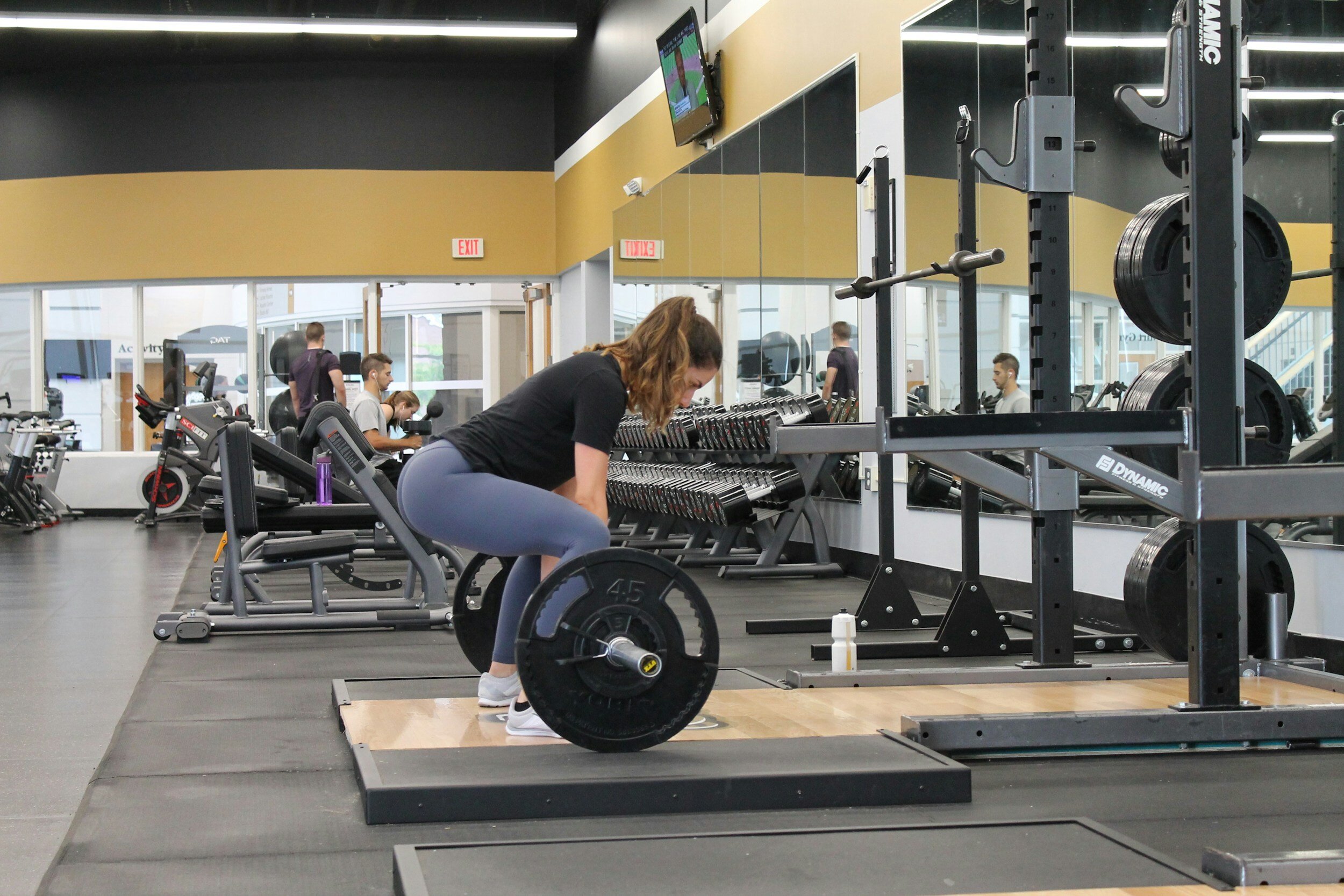
Personal Trainer and Feldenkrais Method Practioner with 20 years Experience in Old Street (Shoreditch) London. One to One and Online.
The Consequences of Poor Sleep
In today's fast-paced world, getting a good night's sleep has become a luxury for many individuals. Whether it be due to work demands, family responsibilities, or simply the inability to unwind, sleep is often sacrificed in favor of other activities. However, the repercussions of consistently getting poor sleep are substantial and can have a profound impact on both physical and mental well-being.
In today's fast-paced world, getting a good night's sleep has become a luxury for many individuals. Whether it be due to work demands, family responsibilities, or simply the inability to unwind, sleep is often sacrificed in favor of other activities. However, the repercussions of consistently getting poor sleep are substantial and can have a profound impact on both physical and mental well-being.
Cognitive Impairment
One of the most immediate consequences of sleep deprivation is cognitive impairment. When sleep is insufficient, concentration, attention, reasoning, and problem-solving abilities are all significantly compromised. Studies have shown that individuals who are sleep-deprived are more likely to make errors at work, have slower reaction times, and experience memory issues. This cognitive fog can have serious implications, especially in situations that require quick thinking and sharp decision-making.
Emotional Instability
Lack of sleep also affects mood regulation. Sleep-deprived individuals often experience irritability, mood swings, and heightened emotional reactivity. Chronic sleep deprivation has been linked to an increased risk of developing mood disorders such as depression and anxiety. Moreover, ongoing poor sleep can strain personal relationships, as individuals may find it challenging to manage their emotions and interact effectively with others.
Physical Health
The impact of poor sleep extends beyond cognitive and emotional well-being and can manifest in physical health problems as well. Research has shown that inadequate sleep is associated with a higher risk of developing chronic conditions such as obesity, hypertension, diabetes, and cardiovascular disease. Additionally, the immune system's ability to fight off infections is compromised when sleep is insufficient, making sleep-deprived individuals more susceptible to illnesses.
Reduced Performance
For those who lead an active lifestyle or engage in sports, the effects of poor sleep on physical performance are particularly noteworthy. Athletes who do not get adequate rest may experience decreased endurance, coordination, and strength. Recovery time after workouts or competitions is also prolonged, hindering progress and increasing the likelihood of injuries. In a competitive environment where marginal gains can make a significant difference, sleep is a critical component of an athlete's training regimen.
Missed Opportunities
Beyond the immediate consequences on health and performance, poor sleep can also lead to missed opportunities in various aspects of life. Whether it be a promotion at work that requires heightened productivity, the chance to engage in social activities with friends, or simply enjoying quality time with loved ones, being sleep-deprived can hinder one's ability to fully participate in and savor life's experiences.
In conclusion, the effects of poor sleep are far-reaching and multifaceted. From cognitive impairment and emotional instability to physical health problems and missed opportunities, the impact of sleep deprivation on overall well-being cannot be overstated. Prioritizing healthy sleep habits is essential for maintaining a balanced and fulfilling life. By recognizing the importance of quality rest, individuals can take proactive steps to ensure they reap the numerous benefits that come with a good night's sleep.
The Decline of Movement
Physical activity levels have significantly declined over the past five decades. According to a study published in the American Journal of Preventive Medicine, the average step count for adults in the United States has decreased by 42% since the 1960s. This trend is troubling, considering the numerous health benefits associated with regular physical activity.
A sedentary lifestyle, characterized by prolonged periods of sitting and minimal movement, has become increasingly common due to technological advancements and changes in our daily routines. The rise of desk jobs, increased screen time, and the convenience of motorized transportation have all contributed to this decrease in physical activity.
Physical activity levels have significantly declined over the past five decades. According to a study published in the American Journal of Preventive Medicine, the average step count for adults in the United States has decreased by 42% since the 1960s. This trend is troubling, considering the numerous health benefits associated with regular physical activity.
A sedentary lifestyle, characterized by prolonged periods of sitting and minimal movement, has become increasingly common due to technological advancements and changes in our daily routines. The rise of desk jobs, increased screen time, and the convenience of motorized transportation have all contributed to this decrease in physical activity.
Sedentary behavior has been linked to a myriad of negative health effects. Prolonged sitting or inactivity can increase the risk of obesity, heart disease, type 2 diabetes, and certain types of cancer. Additionally, a sedentary lifestyle is associated with weaker muscles, poor posture, and an increased likelihood of experiencing mental health issues such as depression and anxiety.
Proactive steps to take
Incorporating more daily movement into your life is crucial for improving your overall health and well-being. One effective strategy is to take more active transportation, such as walking or biking, for short trips instead of driving. This not only helps increase your daily step count but also reduces carbon emissions and traffic congestion. For some, getting a dog can be a valuable addition to encourage more daily steps.
Another way to incorporate more movement into your daily routine is to take regular breaks from sitting. Set a timer to remind yourself to stand up, stretch, and walk around every hour, especially if you have a desk job. These short activity breaks can help counteract the negative effects of prolonged sitting on your health. The use of a stand up desk is another valuable strategy.
Household chores and gardening are also great ways to stay active without hitting the gym. Vacuuming, mowing the lawn, raking leaves, and other household tasks can contribute to your daily physical activity level. Additionally, gardening not only provides light to moderate physical activity but also offers mental health benefits by connecting you with nature.
Engaging in recreational activities such as hiking, swimming, dancing, or playing sports with friends and family can make staying active more enjoyable and social. These activities not only help you stay fit but also boost your mood and reduce stress levels.
In conclusion, the decline in physical activity levels over the past 50 years is a concerning trend with far-reaching implications for public health. We cannot ignore our evolutionary roots, which mean our bodies crave daily movement in order to function optimally. Think how unwell a dog or cat would become were it to be restricted from moving. The same applies to us slightly evolved apes too!
By making simple lifestyle changes and incorporating more movement into your daily routine, you can improve your health, reduce the risks of chronic diseases, and enhance your overall quality of life. Let’s commit to moving more and sitting less for a healthier future.
5 Benefits of Lifting Weights
Lifting weights is one of the most powerful investments in time for improving your health and quality of life. Investing only two to three hours per week will make a positive impact. Below I discuss just five of the myriad of benefits-
5 Benefits of Lifting Weights: A Comprehensive Guide
Lifting weights is one of the most powerful investments in time for improving your health and quality of life. Investing only two to three hours per week will make a positive impact. Below I discuss just five of the myriad of benefits-
Increased Muscle Mass and Strength
One of the most well-known benefits of lifting weights is the promotion of muscle growth and strength. Regular weight training stimulates muscle protein synthesis, leading to muscle hypertrophy. A meta-analysis published in the "Journal of Strength and Conditioning Research" (West et al., 2012) found a significant correlation between resistance training and muscle mass gains in young adults. Moreover, a study by Peterson et al. (2011) demonstrated that resistance training can increase muscle strength by up to 40% after just four months.
Improved Metabolic Health
Lifting weights can have profound effects on metabolic health. Research conducted by Strasser et al. (2010) indicated that resistance training is effective in lowering HbA1c levels in individuals with type 2 diabetes, thus improving glycemic control. Additionally, a systematic review by Kelley et al. (2017) revealed that resistance training can lead to reductions in visceral fat, a significant risk factor for metabolic syndrome.
Enhanced Bone Density
Weight-bearing exercises, such as lifting weights, are crucial for maintaining optimal bone health. A study published by Mohammed H. Saiem Aldahr Bone Mineral Status Response to Aerobic Versus Resistance Exercise Training in Postmenopausal Women showed that resistance training can increase bone mineral density in postmenopausal women, reducing the risk of osteoporosis. Similarly, a meta-analysis by Zhao et al. (2018) highlighted the positive impact of resistance training on bone health in older adults.
Better Mental Health
Engaging in regular weightlifting sessions can have beneficial effects on mental well-being. Research by Gordon et al. (2017) demonstrated that resistance training can reduce symptoms of depression and anxiety. Furthermore, a study published in the "Journal of Sports Sciences" (Hassmen et al., 2000) reported that weight training can improve self-esteem and cognitive function in individuals of all ages.
Enhanced Quality of Life
Lifting weights not only improves physical health but also enhances overall quality of life. A study by Christopher J. Keating found that resistance training is associated with increased functional capacity and independence in older adults. Moreover, a meta-analysis conducted by Sherrington et al. (2017) revealed that strength training can reduce the risk of falls in the elderly, promoting longevity and well-being.
In conclusion, lifting weights offers a wide range of benefits, including increased muscle mass and strength, improved metabolic health, enhanced bone density, better mental health, and an overall enhanced quality of life. Incorporating resistance training into your fitness routine can lead to profound improvements in both physical and mental well-being, making it a valuable component of a healthy lifestyle.
The Mindset for Suceess
Setting and achieving fitness goals can be both challenging and rewarding. The key to reaching your goals lies not only in the physical actions you take but also in the mindset you adopt. A strong and positive mindset can be the driving force that propels you toward success in your fitness journey. Here, we explore the mindset necessary to achieve your fitness goals and provide valuable tips for cultivating the right mental attitude.
The Mindset for Success in Achieving Your Fitness Goals
Setting and achieving fitness goals can be both challenging and rewarding. The key to reaching your goals lies not only in the physical actions you take but also in the mindset you adopt. A strong and positive mindset can be the driving force that propels you toward success in your fitness journey. Here, we explore the mindset necessary to achieve your fitness goals and provide valuable tips for cultivating the right mental attitude.
1. Set Clear and Realistic Goals
One of the first steps in adopting a successful mindset for fitness is setting clear and realistic goals. Your goals should be specific, measurable, achievable, relevant, and time-bound (SMART). By having a clear target in mind, you can focus your efforts and track your progress along the way.
In my twenty years' experience as a personal training trainer, slow and steady has been the most sustainable approach for the majority of my clients. You can surely help light a fire under your a*s if you have a time-sensitive goal such as a holiday or wedding to get in better shape for, but if you take the approach to a more aggressive, shorter-term push, you need to do it with the understanding that you will need to back off the accelerator after the event and move to a slower, sustainable time frame.
2. Stay Motivated
Maintaining motivation is crucial in achieving your fitness goals. Find sources of inspiration that resonate with you, whether it's a role model, a fitness challenge, or simply a desire to improve your health and well-being. Remind yourself regularly of why you embarked on this journey in the first place to keep your motivation levels high.
Motivation doesn’t always have to be framed from a positive place. You can harness a negative comment someone has made about you. I’ve seen the power of “f*ck you, I’ll show you” can be immensely powerful if directed properly.
3. Embrace Consistency
Consistency is key to seeing results in your fitness journey. Develop a routine that works for you and stick to it. Show up for your workouts, make healthy choices consistently, and trust the process. Progress may be slow at times, but staying consistent will eventually lead to tangible results.
Theres no way to side step consistency and this is where an appointment with a personal trainer can make a big difference.
4. Practice Patience
Fitness goals take time to achieve, and it's essential to practice patience along the way. Understand that setbacks and plateaus are a natural part of the process and use them as opportunities to learn and grow. Embrace the journey and celebrate small victories to stay positive and motivated.
Despite what many adverts may promise, you can’t have it tomorrow. Big changes take time to achieve. Just as someone doesn’t get into bad health or shape overnight, nor does someone miraculously improve overnight either.
5. Focus on the Journey, Not Just the Destination
While having clear goals is important, it's equally vital to enjoy the journey toward achieving them. Find joy in the process of becoming fitter, stronger, and healthier. Celebrate your progress, no matter how small, and appreciate the positive changes happening in both your body and mind.
This emphasizes why it's important to be diligent in tracking your workouts. You need the benchmarks to not only progress but to be able to reflect in future how far you have come. Progress photos can also be a powerful tool in this regard.
6. Stay Mindful and Listen to Your Body
Listen to your body's signals and practice mindfulness in your fitness routine. Pay attention to how your body responds to different workouts, rest days, and nutrition choices. Respect your body's limitations, rest when needed, and prioritize recovery to avoid burnout and injury.
A common trap is to go too hard too soon and end up burned out or worse with an injury.
7. Seek Support and Stay Positive
Surround yourself with a supportive community that encourages and uplifts you in your fitness journey. Share your goals with friends, family, or a coach who can provide accountability and motivation. Stay positive, practice self-compassion, and believe in your ability to overcome challenges and achieve your goals.
If you have people in your life who are negative about your efforts to improve your health and fitness, then they are not the right people to be spending time with if you want to make real measurable changes. Draw your strong boundaries with these people and, if they continue, eliminate or minimize time spent with these types.
In conclusion, adopting a successful mindset for achieving your fitness goals involves setting clear objectives, staying motivated, embracing consistency, practicing patience, focusing on the journey, staying mindful, and seeking support. By cultivating a positive and resilient mindset, you can overcome obstacles, stay committed to your goals, and ultimately achieve success in your fitness journey. Remember, the right mindset is your most powerful asset on the path to a healthier and happier you.
Health is Wealth
When it comes to our health and financial well-being, the power of investing cannot be overstated. While it may seem like exercise and financial planning exist in separate realms, they share striking similarities when it comes to building long-term benefits. Just as financial investments yield returns over time, exercise investments pay off in improved physical and mental health that compound over the years, creating a foundation for long-term well-being.
The Parallel Between Investing in Exercise and Investing in Long-Term Financial Wealth
When it comes to our health and financial well-being, the power of investing cannot be overstated. While it may seem like exercise and financial planning exist in separate realms, they share striking similarities when it comes to building long-term benefits. Just as financial investments yield returns over time, exercise investments pay off in improved physical and mental health that compound over the years, creating a foundation for long-term well-being.
Compound Returns: The Power of Consistency
In the world of finance, the concept of compounding is well-known. The idea is simple: the money you invest earns returns, which are then reinvested to generate even more returns. Over time, this compounding effect can significantly grow your wealth. Similarly, exercise works on the principle of compounding health benefits. When you consistently engage in physical activity, your body becomes stronger, more resilient, and healthier. These benefits accumulate over time, reducing the risk of various diseases and enhancing your overall well-being.
Risk Management: Strengthening Your Defenses
Just as diversified investments can help mitigate risks in the financial market, regular exercise serves as a form of risk management for your health. Engaging in physical activity strengthens your immune system, lowers your risk of chronic conditions such as heart disease and type 2 diabetes, and enhances mental health by reducing stress and anxiety. By investing in exercise, you are essentially diversifying your health portfolio and building a robust defense system against a range of health threats.
Long-Term Vision: Investing in Your Future Self
Financial planning often involves envisioning your future financial goals and taking steps to achieve them. Similarly, exercise requires a long-term perspective focused on investing in your future self. The physical strength, flexibility, and endurance you build through regular exercise are not just for the present moment but for the years to come. Just as you save and invest for retirement, incorporating exercise into your routine is a way of investing in a healthier and more active future.
Quality of Life Dividends: Enjoying the Returns
At the core of both financial wealth and physical health is the concept of improving your quality of life. Investing in exercise pays dividends in the form of increased energy, improved mood, better sleep, and enhanced cognitive function. These returns translate into a higher quality of life, allowing you to enjoy your days to the fullest. Similarly, financial wealth, when managed well, provides peace of mind, the freedom to pursue your passions, and the ability to weather unforeseen circumstances.
Balanced Portfolio: Integrating Exercise and Financial Health
Just as a balanced investment portfolio mitigates risks and maximizes returns in financial markets, a holistic approach that integrates exercise and financial health leads to a more fulfilling and secure life. By viewing exercise as a long-term investment in your overall well-being, you can create synergies between physical and financial fitness, setting the stage for a prosperous and healthy future.
In conclusion, the parallels between investing in exercise and investing in long-term financial wealth are clear. Both require consistency, a long-term perspective, risk management strategies, and a focus on maximizing returns that enhance your quality of life. By recognizing the value of exercise as a crucial component of your long-term well-being, you can lay the foundation for a healthier, happier, and more prosperous future.
Invest wisely, both in your financial portfolio and in your health, for the ultimate wealth is achieving a balance that enriches every aspect of your life.
The Importance of Sleep
Lack of sleep or poor sleep quality is a prevalent issue in today's society, often overlooked or seen as a minor inconvenience. However, the effects of insufficient or disrupted sleep on overall health and lifespan are profound and far-reaching. Numerous studies have highlighted the negative consequences of inadequate sleep on both physical and mental well-being.
The Impact of Poor Sleep on Health and Lifespan
Lack of sleep or poor sleep quality is a prevalent issue in today's society, often overlooked or seen as a minor inconvenience. However, the effects of insufficient or disrupted sleep on overall health and lifespan are profound and far-reaching. Numerous studies have highlighted the negative consequences of inadequate sleep on both physical and mental well-being.
The Importance of Sleep
Sleep is a crucial component of a healthy lifestyle, alongside proper nutrition and regular exercise. It is during sleep that the body repairs and rejuvenates itself, crucial for maintaining optimal cognitive function, emotional well-being, and physical health. The National Sleep Foundation recommends that adults aim for 7-9 hours of quality sleep each night to support overall health and well-being.
Health Implications of Poor Sleep
**1. ** Cardiovascular Health:
Poor sleep has been linked to an increased risk of heart disease, hypertension, and stroke.
Sleep deprivation can lead to higher levels of stress hormones and inflammation, contributing to the development of cardiovascular issues over time.
**2. ** Metabolic Health:
Lack of sleep disrupts the body's hormone balance, affecting appetite regulation and metabolism.
Sleep deprivation is associated with weight gain, insulin resistance, and an increased risk of developing type 2 diabetes.
**3. ** Cognitive Function:
Inadequate sleep can impair cognitive function, memory retention, and decision-making abilities.
Chronic sleep deprivation has been linked to a higher risk of neurodegenerative diseases such as Alzheimer's.
**4. ** Mental Health:
Poor sleep is closely linked to mental health conditions such as depression, anxiety, and mood disorders.
Sleep disturbances can exacerbate existing mental health issues and make it harder to cope with daily stressors.
**5. ** Immune Function:
Quality sleep is vital for a healthy immune system, as it helps the body fight off infections and illnesses.
Chronic sleep deprivation weakens the immune response, making individuals more susceptible to infections and delaying recovery.
Impact on Longevity
The cumulative effects of poor sleep on overall health can significantly impact an individual's lifespan. Studies have shown that consistently getting less than the recommended amount of sleep can shorten life expectancy and increase the risk of premature death. Chronic conditions resulting from inadequate sleep, such as cardiovascular disease, obesity, and diabetes, can further reduce longevity.
Improving Sleep Quality and Duration
Addressing poor sleep habits is crucial for improving health outcomes and increasing lifespan. Here are some tips to promote better sleep:
Establish a Consistent Sleep Schedule: Go to bed and wake up at the same time every day, even on weekends.
Create a Relaxing Bedtime Routine: Engage in calming activities before bed, such as reading or meditating, to signal to your body that it's time to sleep.
Optimize Your Sleep Environment: Ensure your bedroom is dark, quiet, and cool to promote restful sleep.
Limit Screen Time: Avoid screens (phones, computers, TVs) at least an hour before bed, as the blue light can disrupt your body's natural sleep-wake cycle. Using blue light blocking glasses as around sun set can help massively as well as dimming your lights.
Practice Healthy Habits: Stay physically active, eat a balanced diet, and manage stress through relaxation techniques or mindfulness.
Consider supplementing with Magnesium: this mineral is typically low in many people and taking 450-600mg of either a glycinate, taurate, threonate or combination 45 mins before bed can work wonders to help promote better quality sleep.
Conclusion
In conclusion, poor sleep quality and inadequate sleep duration have significant implications for overall health and longevity. Prioritizing sleep as a key component of a healthy lifestyle is essential for maintaining physical, mental, and emotional well-being. By recognizing the importance of good sleep hygiene and making conscious efforts to improve sleep quality, individuals can positively impact their health outcomes and potentially increase their lifespan. It is crucial to address any underlying sleep issues promptly and seek professional help if necessary to ensure a restful night's sleep and a healthier, longer life.
The Importance of Regulating Your Nervous System
In today's fast-paced world, many of us are constantly bombarded with stressors that can wreak havoc on our nervous systems. From work deadlines to family responsibilities to financial pressures, the demands of modern life can leave us feeling overwhelmed and anxious. However, understanding the importance of regulating our nervous systems can be the key to maintaining our overall health and well-being.
The Importance of Regulating Your Nervous System
In today's fast-paced world, many of us are constantly bombarded with stressors that can wreak havoc on our nervous systems. From work deadlines to family responsibilities to financial pressures, the demands of modern life can leave us feeling overwhelmed and anxious. However, understanding the importance of regulating our nervous systems can be the key to maintaining our overall health and well-being.
What is the Nervous System?
The nervous system is a complex network of nerves and cells that transmit signals between different parts of the body. It is divided into two main parts: the central nervous system, which includes the brain and spinal cord, and the peripheral nervous system, which encompasses all other nerves in the body. The nervous system plays a crucial role in regulating everything from movement and sensation to emotions and cognition.
The Impact of Stress on the Nervous System
When we experience stress, whether physical or emotional, our bodies go into "fight or flight" mode, triggering a cascade of physiological responses. This response is controlled by the sympathetic nervous system, which is responsible for preparing the body for action in times of danger. While this response is crucial for short term survival, chronic stress can lead to dysregulation of the nervous system, resulting in a host of negative health outcomes.
One way stress damages the body is through the release of stress hormones such as cortisol and adrenaline. These hormones are useful in the short term to help the body react quickly to perceived threats, but when constantly elevated, they can contribute to increased heart rate, elevated blood pressure, and weakened immune function.
Moreover, stress can also impact digestive health, leading to issues such as irritable bowel syndrome (IBS), heartburn, or stomach ulcers. The gut-brain connection plays a significant role in how stress affects our digestive system.
Furthermore, chronic stress is linked to sleep disturbances, which can further exacerbate the negative effects on the body. Lack of quality sleep can impair cognitive function, weaken the immune system, and contribute to overall feelings of fatigue and irritability.
Why Regulating Your Nervous System is Important
Stress Reduction: By learning to regulate our nervous systems, we can reduce the impact of stress on our bodies. Techniques such as deep breathing, meditation, and progressive muscle relaxation can help activate the parasympathetic nervous system, which promotes relaxation and counteracts the effects of stress.
Improved Sleep: A dysregulated nervous system can wreak havoc on our sleep patterns, leading to insomnia and poor sleep quality. By incorporating nervous system regulation techniques into our bedtime routine, we can promote better sleep and wake up feeling refreshed and rejuvenated.
Enhanced Mental Health: Chronic stress and an imbalanced nervous system have been linked to mental health conditions such as anxiety and depression. By practicing nervous system regulation, we can promote emotional well-being and resilience in the face of life's challenges.
Better Physical Health: Research has shown that chronic stress and dysregulation of the nervous system can contribute to a variety of physical health problems, including cardiovascular disease, digestive issues, and weakened immune function. By taking steps to regulate our nervous systems, we can improve our overall health and reduce the risk of these conditions.
Techniques for Regulating Your Nervous System
Deep Breathing: Take slow, deep breaths to activate the parasympathetic nervous system and promote relaxation.
Physical Contact with Loved Ones: The benefits of a good hug are not to be underestimated. Massages can also promote relaxation.
Meditation: Mindfulness meditation can help calm the mind and reduce stress.
Somatic Practices: Approaches such as the Feldenkrais Method can help bring the body into a more relaxed state.
Progressive Muscle Relaxation: Tense and relax each muscle group in the body to release physical tension.
Therapy: Working to improve our patterns on how we manage things can vastly improve our reaction to stress.
Yoga: Combining movement with breath work, yoga can help regulate the nervous system and promote relaxation.
Music: For some music can be a powerful modulator of mood and relaxation. Singing potentially can be included in this.
Laughter: Comedy can be a powerful tool to help someone loosen off and feel less stressed through laughter.
Biofeedback: Utilize technology to monitor and train the body's physiological responses to stress.
Ultimately every person has to find the best strategy that works for them in getting themselves into a parasympathetic (relaxed) state. Experiment and find strategies that work for you.
Conclusion
In conclusion, regulating your nervous system is essential for maintaining overall health and well-being in today's hectic world. By incorporating techniques to reduce stress and promote relaxation, you can support your nervous system and reap the numerous benefits that come with a balanced and regulated internal environment. Prioritizing nervous system regulation is not only a proactive step towards better health but also a vital component of self-care and personal growth. Start implementing these techniques today and experience the transformative power of a regulated nervous system.
The Health Effects of Vitamin D
Vitamin D is a crucial nutrient that plays a significant role in maintaining optimal health. It is often referred to as the "sunshine vitamin" because our bodies can produce it when exposed to sunlight. Vitamin D receptors are found in various tissues and organs, indicating its involvement in multiple bodily functions, including bone health, immune system support, and overall well-being.
The Importance of Vitamin D for Health
Vitamin D is a crucial nutrient that plays a significant role in maintaining optimal health. It is often referred to as the "sunshine vitamin" because our bodies can produce it when exposed to sunlight. Vitamin D receptors are found in various tissues and organs, indicating its involvement in multiple bodily functions, including bone health, immune system support, and overall well-being.
Research suggests that vitamin D may play a role in supporting the immune system, cardiovascular health, and muscle function. It is also being studied for its potential effects on mood and mental health. Adequate levels of vitamin D are crucial for overall health and well-being.
As we learn more about the importance of vitamin D as a prohormone, it is essential to ensure that we are getting enough of this nutrient through safe sun exposure, diet, or supplementation. Checking vitamin D levels through blood tests can help determine if supplementation is necessary. Remember to consult a healthcare provider before making any significant changes to your vitamin D intake.
Bone Health
One of the primary functions of vitamin D is to regulate calcium and phosphorus levels in the body, which are vital for maintaining strong and healthy bones. Vitamin D helps the body absorb calcium from the diet and ensures that an adequate amount of this mineral is available for bone formation. Without enough vitamin D, the body struggles to absorb calcium efficiently, leading to weakened bones and an increased risk of fractures and osteoporosis.
Immune System Support
Vitamin D also plays a crucial role in supporting the immune system. Research has shown that vitamin D helps regulate the immune response and can reduce inflammation in the body. Adequate vitamin D levels have been associated with a lower risk of autoimmune diseases, such as multiple sclerosis and rheumatoid arthritis, as well as a reduced susceptibility to infections like the flu and the common cold. When you're feeling under the weather, it's common for your Vitamin D levels to take a hit. However, during illness, our bodies may struggle to maintain adequate Vitamin D levels due to various factors such as decreased sunlight exposure, altered metabolism (its need being increased to fight off the illness), or compromised nutrient absorption.
It's important to be mindful of this depletion and consider supplementing with Vitamin D to support your immune function, especially when you're feeling unwell. Consulting a healthcare provider for personalized advice on supplementation during illness is recommended to help ensure you are taking the appropriate dosage for your specific needs. Remember, maintaining optimal Vitamin D levels is essential for overall health and well-being, particularly during times when your body needs extra support to combat illness.
Mood and Mental Health
In addition to its physical health benefits, vitamin D is also thought to play a role in mental health and well-being. Some studies have suggested a link between vitamin D deficiency and conditions like depression and seasonal affective disorder (SAD). Researchers believe that vitamin D may help regulate mood and improve symptoms of depression by influencing the production of neurotransmitters in the brain.
Spending time outdoors daily is crucial for ensuring adequate Vitamin D levels in the body. The sun's ultraviolet B (UVB) rays stimulate Vitamin D production in the skin.
However, many people have indoor lifestyles due to work or other commitments, leading to Vitamin D deficiency.
To maintain optimal Vitamin D levels, it is recommended to spend about 10-30 minutes in the sun without sunscreen between 10 am and 3 pm, at least twice a week. This exposure can vary based on skin type, location, and time of year.
Sources of Vitamin D
While sunlight is a primary source of vitamin D, it can also be obtained in lower amounts from certain foods and supplements. Fatty fish like salmon, tuna, and mackerel are excellent dietary sources of vitamin D. Fortified foods such as milk, orange juice, and cereals can also contribute to vitamin D intake. However, for many people, especially those living in northern latitudes or with limited sun exposure, supplementing with vitamin D may be necessary to maintain optimal levels.
Conclusion
In conclusion, vitamin D is a vital nutrient that plays a crucial role in maintaining overall health and well-being. From supporting bone health and immune function to potentially influencing mood and mental health, vitamin D is involved in numerous bodily processes. Ensuring an adequate intake of vitamin D through sunlight, diet, and supplements is essential for optimal health. If you suspect you may have a vitamin D deficiency, consult with your healthcare provider to discuss testing and appropriate supplementation. Remember, a balanced approach to sun exposure, along with a healthy diet and lifestyle, can help you maintain adequate vitamin D levels and support your health for years to come.
The Physical and Cognitive Benefits of Creatine
Creatine is a naturally occurring compound that plays a crucial role in the production of energy during high-intensity, short-duration activities such as weightlifting and sprinting. While our bodies produce creatine endogenously, it is also obtained through dietary sources such as red meat and fish. However, many individuals, especially athletes and bodybuilders, turn to creatine supplementation to enhance their performance and support their fitness goals. In this article, we will delve into the health benefits of creatine supplementation, debunk common misconceptions, and provide insights into safe and effective usage.
Exploring the Health Benefits of Creatine Supplementation
Creatine is a naturally occurring compound that plays a crucial role in the production of energy during high-intensity, short-duration activities such as weightlifting and sprinting. While our bodies produce creatine endogenously, it is also obtained through dietary sources such as red meat and fish. However, many individuals, especially athletes and bodybuilders, turn to creatine supplementation to enhance their performance and support their fitness goals. In this article, we will delve into the health benefits of creatine supplementation, debunk common misconceptions, and provide insights into safe and effective usage.
Improved Exercise Performance
One of the primary reasons individuals turn to creatine supplementation is its well-documented benefits in improving exercise performance, especially during high-intensity, short-duration activities. Creatine helps regenerate adenosine triphosphate (ATP), the primary energy source for muscle contractions, at a faster rate. This allows individuals to push harder during workouts, resulting in increased strength, power, and endurance.
Research studies have consistently shown that creatine supplementation is effective in enhancing performance in activities such as weightlifting, sprinting, and high-intensity interval training (HIIT). Athletes who incorporate creatine into their training regimen often experience improved workout capacity and faster recovery between high-intensity bouts.
Muscle Growth and Volume
In addition to its performance-enhancing properties, creatine supplementation has been linked to increased muscle growth and volume. By drawing water into muscle cells, creatine promotes cell volumization, which can lead to a fuller and more “pumped” appearance. This increase in muscle hydration can also stimulate muscle protein synthesis, contributing to muscle hypertrophy over time.
Moreover, creatine has been shown to upregulate insulin-like growth factor-1 (IGF-1) expression in muscles, further supporting muscle growth and repair processes. Individuals looking to enhance their muscle mass and strength often find creatine supplementation to be a valuable addition to their nutrition and training routines.
Cognitive Benefits
Beyond its physical performance benefits, creatine supplementation has also been associated with cognitive enhancements. Research suggests that creatine plays a role in brain energy metabolism and neuroprotection, potentially improving cognitive function and memory. Some studies have explored the benefits of creatine supplementation in conditions such as depression, Parkinson’s disease, and age-related cognitive decline, with promising results.
Athletes and individuals seeking not only physical performance gains but also cognitive benefits may find creatine supplementation beneficial in supporting mental sharpness and acuity, especially during demanding training sessions or competitions.
Debunking Common Myths
Despite its well-established benefits, creatine has often been surrounded by misconceptions and myths. One common myth is that creatine is a form of anabolic steroid, which is untrue. Creatine is a natural compound found in our bodies and various foods, and when used responsibly, it is considered safe and legal for most individuals.
Another myth is that creatine causes dehydration or kidney damage. On the contrary, numerous studies have shown that when consumed within recommended guidelines, creatine supplementation is safe for healthy individuals and does not pose a risk to kidney function. Adequate hydration is essential when supplementing with creatine to maximize its benefits and prevent potential side effects like muscle cramping.
Safe and Effective Usage
When considering creatine supplementation, it is crucial to prioritize quality, dosage, and hydration. Opt for reputable brands that provide high-quality creatine monohydrate, the most studied and widely used form of creatine. There are two ways to take it you can begin with a loading phase of around 20 grams per day split into 4 doses for 5-7 days to saturate muscle creatine stores, followed by a maintenance phase of 5 grams per day to sustain elevated creatine levels or you can just take 5 grams per day and you should reach maximum saturation in about 30 days.
Individuals should also prioritize staying hydrated while using creatine to support muscle function and overall health. Consulting with a healthcare provider or a nutrition expert before starting a creatine regimen is recommended, especially for individuals with preexisting medical conditions or concerns.
In conclusion, creatine supplementation offers a range of health benefits, from improved exercise performance and muscle growth to cognitive enhancements. When used responsibly and in conjunction with a balanced diet and proper training program, creatine can be a valuable ally in achieving fitness goals and optimizing overall health and well-being.
Remember, it is essential to approach supplementation, including creatine, with an informed and cautious mindset to maximize benefits and minimize potential risks. As with any dietary supplement, individual responses may vary, so listening to your body and seeking professional guidance when needed are key to leveraging the advantages of creatine supplementation effectively.
By understanding the science behind creatine and adopting a sensible approach to usage, individuals can harness the power of this natural compound to support their fitness journey and enhance their performance levels in a safe and sustainable manner.
Why its NEAT to Move More
Non-Exercise Activity Thermogenesis (NEAT) plays a critical role in overall health and body composition. NEAT refers to the energy expended for everything we do that is not sleeping, eating, or sports-like exercise. This includes activities such as walking, standing, fidgeting, and even typing. While it may seem trivial compared to structured exercise, NEAT can significantly impact our energy expenditure and ultimately our weight and overall health.
The Importance of Non-Exercise Activity Thermogenesis (NEAT) for Health and Body Composition
Non-Exercise Activity Thermogenesis (NEAT) plays a critical role in overall health and body composition. NEAT refers to the energy expended for everything we do that is not sleeping, eating, or sports-like exercise. This includes activities such as walking, standing, fidgeting, and even typing. While it may seem trivial compared to structured exercise, NEAT can significantly impact our energy expenditure and ultimately our weight and overall health.
Understanding NEAT
NEAT was first introduced by Dr. James Levine, who found that some people burned significantly more calories through daily activities than others, even when accounting for differences in weight, age, and body composition. This discovery highlighted the importance of NEAT in weight management and metabolic health.
The energy expended through NEAT can vary greatly from person to person and can be influenced by occupation, lifestyle, environment, and personal habits. For example, someone with a desk job may have much lower NEAT levels compared to a construction worker or even a coffee barista who are on their feet and constantly moving throughout the day.
Health Benefits of NEAT
Weight Management: NEAT can have a significant impact on weight management. Increasing NEAT, even without structured exercise, can help burn more calories throughout the day, contributing to a negative energy balance and potential weight loss.
Metabolic Health: NEAT has been linked to improved metabolic health. Studies have shown that higher NEAT levels are associated with better insulin sensitivity, blood sugar control, and lipid profiles.
Cardiovascular Health: Regular physical activity, including NEAT, is crucial for cardiovascular health. Incorporating more movement throughout the day can help improve circulation, reduce the risk of heart disease, and enhance overall fitness levels.
Incorporating NEAT into Daily Life
Given the sedentary nature of many modern lifestyles, intentionally increasing NEAT can be beneficial for overall health and well-being. Here are some practical tips to incorporate more NEAT into your daily routine:
Take the Stairs: Opt for the stairs instead of the elevator whenever possible. Climbing stairs is a great way to sneak in extra physical activity throughout the day.
Walk More: Aim to increase your daily step count by parking farther away, taking short walking breaks during work, or going for a post-meal stroll.
Stand Up: If you have a desk job, consider using a standing desk or taking regular breaks to stand and stretch. Standing burns more calories than sitting and can help improve posture and circulation.
Household Chores: Embrace household chores as a way to increase NEAT. Activities like vacuuming, gardening, or washing dishes can all contribute to higher energy expenditure.
Stay Active: Find activities you enjoy that involve movement, such as dancing, gardening, or playing with pets or children. The key is to keep moving throughout the day.
Conclusion
Non-Exercise Activity Thermogenesis (NEAT) may not always receive the same attention as structured exercise, but its impact on health and body composition should not be underestimated. By increasing daily movement and incorporating more NEAT into our routines, we can improve energy expenditure, support weight management, and enhance overall well-being. Prioritizing NEAT alongside regular exercise can lead to a more active and healthier lifestyle in the long run.
Only Compare Yourself to Yourself
In the realm of fitness and well-being, it is all too easy to fall into the trap of comparison. With the rise of social media platforms flooded with meticulously curated snapshots of individuals' fitness achievements and transformations, it can be challenging not to measure our progress against those around us. However, it is crucial to understand that each person's fitness journey is deeply personal and unique, and comparison often leads to detrimental outcomes rather than motivation.
Embracing Your Individual Fitness Journey: The Pitfalls of Comparing Progress
In the realm of fitness and well-being, it is all too easy to fall into the trap of comparison. With the rise of social media platforms flooded with meticulously curated snapshots of individuals' fitness achievements and transformations, it can be challenging not to measure our progress against those around us. However, it is crucial to understand that each person's fitness journey is deeply personal and unique, and comparison often leads to detrimental outcomes rather than motivation. What further muddies the waters is predatory advertising methods that make unrealistic promises and warp expectations. Combined with filters and editing, it can be hard to know what the truth is and real anymore.
The Dangers of Comparison
Constantly measuring our progress against others can breed feelings of inadequacy, self-doubt, and demotivation. Everyone's body is different, and factors such as genetics, age, fitness level, injuries, and lifestyle play a significant role in shaping our individual paths. Drawing comparisons based on superficial aspects like weight, muscle mass, or endurance overlooks the holistic nature of well-being and fails to acknowledge the many factors that contribute to a person's overall health. Sadly, a lot of marketing is based upon this model. Researchers know that people who feel insecure and unhappy are going to buy more of their sh*t.
Understanding Individuality
Instead of fixating on how our progress aligns with others, we should shift our focus inward and understand our unique circumstances, goals, and limitations. Embracing our individuality allows us to tailor our fitness journey to suit our specific needs, preferences, and abilities. What works for one person may not necessarily work for another, and honouring this diversity is essential for long-term success and fulfillment.
Take monthly photos to track your progress. When you see yourself too frequently, you often don't notice the differences. Most of us have the experience of meeting someone you haven’t seen for months and for them to comment positively on how much you have changed physically.
Celebrating Small Wins
Progress in fitness is not always linear, and setbacks are a natural part of the process. By letting go of comparisons, we can shift our perspective towards celebrating our own victories, no matter how small they may seem. Whether it's completing an extra rep, improving flexibility, or simply showing up consistently, every step forward is a cause for celebration and a testament to our commitment to self-improvement. It’s a cliché, but it really is like carving a statue out of a piece of marble. Chipping away week after week and month after month is what really makes big changes.
Finding Community Support
While comparison can be isolating, recognizing the shared experiences and struggles within the fitness community can foster a sense of belonging and camaraderie. Surrounding ourselves with supportive individuals who uplift and encourage us can help shift our focus from competition to collaboration. Rather than seeing others as rivals, viewing them as sources of inspiration and learning can enrich our own journey and create a more positive mindset.
This applies to the place that you train, the partner that you have and the friends you spend time with. If it's not a supportive environment for your growth, then some of these dynamics need to be reconsidered.
Cultivating Self-Compassion
Above all, embracing our individual fitness journey requires cultivating self-compassion and self-acceptance. Recognizing that progress takes time, patience, and consistency allows us to approach our goals with a sense of grace and understanding. By being kind to ourselves, acknowledging our efforts, and learning from our setbacks, we can navigate the ups and downs of our journey with resilience and determination.
In conclusion, comparing our progress to others is a fruitless endeavor that detracts from the essence of our individual fitness journey. By embracing our uniqueness, celebrating our achievements, seeking support from the community, and practicing self-compassion, we can embark on a path of growth and self-discovery that is truly our own. Remember, your journey is yours alone, and it is in embracing this truth that you will find the true essence of personal transformation and fulfillment in your fitness endeavors.
The Importance of Consistency
Consistency is a fundamental principle when it comes to making successful changes in health and fitness. I’d argue further its fundamental in achieving anything significant. Whether you are embarking on a weight loss journey, aiming to build muscle, or simply trying to improve your overall well-being, staying consistent is key to seeing real and lasting results. In this article, we will explore the reasons why consistency is crucial and how you can incorporate it into your daily routine to achieve your health and fitness goals.
The Importance of Consistency in Achieving Health and Fitness Goals
Consistency is a fundamental principle when it comes to making successful changes in health and fitness. I’d argue further that it's fundamental to achieve something significant. Whether you are embarking on a weight-loss journey, aiming to build muscle, or simply trying to improve your overall well-being, staying consistent is key to seeing real and lasting results. In this article, we will explore the reasons why consistency is crucial and how you can incorporate it into your daily routine to achieve your health and fitness goals.
Anyone you see with a good level of strength or a body shape that you deem hot or impressive has put a lot of time and effort into it. Now I understand that not everyone desires to go for a fitness model look, but consistency is still important, even if you just want to feel a bit better and reap the psychological & health benefits from it.
Consistency Breeds Habits
One of the primary reasons why consistency is essential for success in health and fitness is that it helps to establish habits. When you consistently engage in healthy behaviours such as exercise, proper nutrition, and adequate rest, you are reinforcing positive habits that will eventually become second nature. By making these habits a regular part of your daily routine, you are setting yourself up for long-term success.
Forming better habits tends to work best when you make substitutions rather than trying to just eliminate what you deem as a bad habit. For example, if you typically consume half a pint of ice cream on Friday evening, maybe as a first step, you can replace Ben & Jerry’s with an ice cream like Halo Top which is lower in calories and higher in protein. We are really fortunate today that there are so many legitimately tasty ‘health’ food replacements on the market. In past times, I would have been limited to suggesting Greek yogurt with some honey & berries. If you spend 3 hours binging on Netflix, reduce this to two and use the freed up hour to exercise.
Progressive Adaptation
Consistency is also vital because it allows your body to adapt and improve over time. When you engage in regular exercise, for example, your muscles, cardiovascular system, and overall fitness level gradually improve in response to consistent stimuli. Without this regular challenge, your body would not have the opportunity to adapt and grow stronger. By staying consistent with your workouts and nutrition, you enable your body to progress steadily towards your goals.
Exercise progress at times can feel like 2 steps forwards and 1 step back, but even more so if you lack consistency. If it were a linear, easy process, everyone would be walking around jacked like a Ken doll. Adaption to exercise is a use or loose it affair; your body won’t hold onto what it deems from a survival standpoint unnecessary; lung power, bone density, tendon & muscle strength etc.
Overcoming Plateaus
In any health and fitness journey, it is common to encounter plateaus where progress seems to stall. Consistency is the key to overcoming these plateaus and pushing through to the next level. By maintaining your efforts even when results are not immediately apparent, you are laying the foundation for future success. Plateaus are a natural part of the process, and it is consistency that will ultimately help you break through and continue making progress.
This is where making sure you have a good programme is important. You should aim to squeeze as much as you can out of a programme before switching to a new one to help foster new levels of progress. A common mistake is to programme hop too frequently, which doesn’t allow enough time to build momentum and consistent progress getting stronger on the assigned exercises.
Building Discipline and Mental Toughness
Consistency in health and fitness not only benefits your body but also helps to build discipline and mental toughness. Sticking to a workout routine or healthy eating plan day in and day out requires commitment and perseverance. By cultivating these qualities through consistency, you develop the mental strength to overcome obstacles and stay focused on your goals, even when faced with challenges.
You can’t always train when you feel 100% and few of us actually feel like that from day to day, especially in the stressful fast paced lifestyle of a big city. In spite of being tired, you still have to get it done, because you understand and respect that this consistency counts and will reap rewards in the long run.
Practical Tips for Maintaining Consistency
Now that we have established the importance of consistency in achieving health and fitness goals, let's explore some practical tips for staying consistent:
Set Clear and Attainable Goals: Define specific, measurable goals that motivate you to stay on track.
Create a Routine: Establish a consistent schedule for your workouts, meals, and rest to help maintain consistency.
Track Your Progress: Keep a journal or use a fitness app to track your workouts, nutrition, and progress towards your goals.
Stay Accountable: Partner with a workout buddy, hire a personal trainer, or join a fitness community to help hold you accountable.
Be Flexible: While consistency is crucial, it's also important to be flexible and adjust your plan as needed to stay on course.
Surround Yourself with the Right People: The saying that you are the sum of the people you spend the most time with is true. If you spend lots of time with lots of people not interested in bettering their health or at least supporting you when you want to, it will be harder to remain consistent.
Set Boundaries: You are exercising for yourself and also because you know when you are fitter and healthier you can perform better both at work and also in your personal relationships. Book out that time for yourself. Your investment in your health is invaluable.
Conclusion
In conclusion, consistency is a cornerstone of success when it comes to making lasting changes in health and fitness. By establishing positive habits, allowing for progressive adaptation, overcoming plateaus, and building discipline, consistency plays a vital role in helping you achieve your goals. By incorporating the practical tips outlined in this article into your daily routine, you can stay consistent in your health and fitness journey and set yourself up for long-term success.
Remember, success is not determined by perfection but by the persistent effort you put in each day. Stay consistent, stay focused, and watch as your health and fitness goals become a reality.
Why you should invest in a slow cooker
In this article I give compelling reasons why you should invest in a slow cooker.
Disclaimer: I don’t sell slow cookers…
The Benefits of Adding a Slow Cooker to Your Kitchen Arsenal
In today's fast-paced world, finding time to prepare healthy, delicious meals can be a challenge. However, investing in a slow cooker can make a significant difference in your ability to maintain a balanced diet while managing a busy lifestyle.
Time-Saving Convenience
One of the most compelling reasons to invest in a slow cooker is the time-saving convenience it offers. With minimal preparation, you can toss a variety of ingredients into the cooker in the morning and return home to a fully cooked meal in the evening. This not only saves valuable time but also eliminates the need for constant supervision while cooking.
Furthermore, slow cooking allows for meal preparation in larger quantities, making it ideal for busy individuals or families. By cooking large batches of food at once, individuals can save time on meal preparation throughout the week and reduce the need for frequent cooking or kitchen clean-up.
An added bonus is your kitchen will smell amazing when you get home too!
Nutrient Preservation
Unlike traditional cooking methods that can lead to nutrient loss, slow cookers operate at low temperatures and retain a higher percentage of nutrients in the food, especially for water-soluble vitamins like vitamin C and B vitamins. This ensures that your meals are not only convenient but also packed with essential vitamins and minerals. Additionally, slow cooking can enhance the bioavailability of certain nutrients, making them easier for the body to absorb.
In contrast, methods such as boiling and frying can lead to significant nutrient losses due to exposure to high heat and prolonged cooking. Boiling, for instance, can cause water-soluble vitamins to leach into the cooking water, diminishing the overall nutritional content of the food. Frying at high temperatures can degrade the nutritional value of oils and lead to the formation of potentially harmful compounds.
While methods like steaming and microwaving are generally gentler and more nutrient-friendly compared to boiling and frying, slow cooking still stands out as a favorable option for preserving the nutritional integrity of food. It's important to note that the specific nutritional impact of cooking methods can vary depending on the type of food being prepared. For instance, certain vegetables may retain more nutrients when steamed rather than slow-cooked.
Versatility in Meal Preparation
Slow cookers are incredibly versatile and can be used to prepare a wide range of dishes, including soups, stews, chili, curries, and even desserts. This flexibility allows you to experiment with new recipes and flavors without adding extra stress to your busy schedule.
Cost-Effective Cooking
Using a slow cooker can help you make the most of budget-friendly ingredients such as tougher cuts of meat and inexpensive vegetables. The slow cooking process tenderizes these ingredients, resulting in flavorful and satisfying meals without breaking the bank. If you cook meat or fish that is still on the bone you get the added benefits of gelatinous rich bone broth in your diet which has a whole host of health benefits.
Tougher, cheaper cuts of meat, such as beef chuck or brisket, lamb neck or shank can be transformed into tender and flavorful dishes through the slow cooking process. This allows for significant savings in comparison to purchasing more expensive cuts.
Furthermore, slow cooking is energy efficient. The process typically involves cooking food at a low temperature over a long period, which consumes less energy than traditional stovetop or oven cooking methods. This results in lower utility bills, making slow cooking a cost-effective choice for long-term use.
Lastly, slow cooking often yields larger quantities of food, making it ideal for meal prepping and reducing the need for dining out or purchasing pre-packaged meals. By preparing meals in advance and utilizing cost-effective ingredients, individuals can effectively stretch their food budget.
Stress-Free Cooking Experience
The set-it-and-forget-it nature of slow cookers eliminates the need for constant oversight, reducing the stress and anxiety often associated with meal preparation. Whether you're juggling work, family responsibilities, or other commitments, the slow cooker provides a hassle-free cooking experience.
If you are tracking your food for your fitness goal by simply calculating the ingredients you put into the slow cooker, then dividing it between the number of portions you are going to make it incredibly eat to remain consistent.
An additional benefit is that there is less washing up afterward compared to using several pots, pans and trays to prepare meals.
Practicality for Health-Conscious Busy Individuals
For individuals focused on health and wellness, a slow cooker can be an invaluable tool. By using wholesome ingredients and minimizing the need for additional fats and oils, it's easier to maintain a nutritious diet without sacrificing flavor or satisfaction.
In conclusion, the slow cooker presents itself as a worthy investment for anyone seeking to balance a busy lifestyle with the desire for convenient, nutritious, and delicious meals. Its time-saving benefits, nutrient preservation, versatility, cost-effectiveness, stress-free cooking experience, and practicality make it an indispensable addition to any kitchen. Whether you're a working professional, a busy parent, or someone with a hectic schedule, the slow cooker can revolutionize your approach to meal preparation and create a positive impact on your overall well-being.
Your Health Is Your Greatest Investment
“You don’t know how important health is until you don’t have it anymore.”
The saying goes-
“You don’t know how important health is until you don’t have it anymore.”
Life today is increasingly busy and stressful. Work is demanding more hours and onto of this you have family commitments you have to attend to.
A huge amount of jobs today are sedentary or requite only light activity. Correlated with this is super easy access to calorific food, increasing levels of obesity and lifestyle related illnesses.
The number of deaths caused by heart and circulatory diseases in under 65s is increasing, peaking at 18,668 in 2017, up from 17,982 five years earlier. This represents a 4% rise in the last five years.
Just over a quarter of the worlds adult population is insufficiently active.
Much of the illness and poor health we experience today is lifestyle related, due to lack of exercise combined, poor management of stress and an overabundance of calorie dense food.
Life up until very recent history except for a very small percentage of wealthy population was physically hard. In order to survive you had to graft as there were few labour saving devices, even washing your clothes by hand took some effort!
Our bodies over a very long time have adapted to work best in an environment where they are physically challenged. We are designed to move and our health expresses itself positively when we do.
A Very Personal Story
I come from a family with a history of poor health. My father died of heart disease when I was 14, from his third and final heart attack. He was obese, ate poorly, didn’t manage his stress well and had poor sleep. It was the perfect storm for illness.
His first ‘warning’ heart attack when I was 10.
A second and much larger one that also led to a stroke hit him when I was 11. He was resustitaed a number of times and he was then intensive care for a number of weeks.
Following this his battled with poor health for another 3 years but aside from some physio therapy to help him to learn to walk again after the stroke he didn’t really make any other changes.
I firmly believe had he taken more proactive measures to improve his health by exercising, eating better, managing his stress and sleeping better he would have lived for many more years than he did. He died at 63 years old.
A brother of mine from the same side of the family died at the age of 55, he too was obese.
Exercise has a massive positive effect on your health
Just a few benefits include
Improved regulation of blood sugar
Positive effect on mental health & stress
Helps fight age related mental decline
Reduced waistline & visceral fat
Improved coordination & balance
So with all the irrefutable evidence at to the importance of exercising you should hopefully be asking yourself how much is your health worth to you?
What sort of investment is better than one into your health?
Can you realistically afford a health episode which could potentially make you unable to work for a number of months?
Its your responsibility to take preemptive measures and start investing in your health.
Where does personal training fit into this?
When your time is limited you want to ensure that the time you invest is spent wisely.
Just 2-3 hours of focused training in the gym per week can be enough to reap most of the health benefits of exercise.
In addition to this I encourage incorporating small daily habits to up your overall level of movement in addition to this. These an be simple things such as waking more, using the stairs, having a stand up desk. Creating these habits as part of your lifestyle is a key component.
Joining a gym with a vague idea of exercising is a recipe for failure and frustration.
If you were to make a financial investment you would seek the help of a financial advisor. The same logic should apply to your health & fitness and you should seek expert advise from an experienced trainer on how to exercise effectively.
Your health is Your Greatest Investment.



















































































